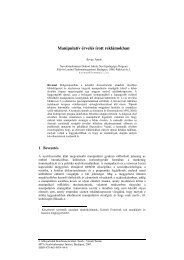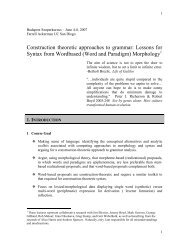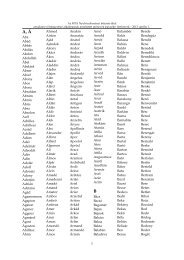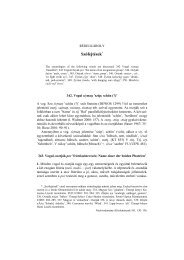Nyelvtudományi közlemények 95. kötet (1996-1997) - MTA ...
Nyelvtudományi közlemények 95. kötet (1996-1997) - MTA ...
Nyelvtudományi közlemények 95. kötet (1996-1997) - MTA ...
Create successful ePaper yourself
Turn your PDF publications into a flip-book with our unique Google optimized e-Paper software.
„Das Ursprüngliche ist das Eigentliche"<br />
- avagy az eredeti és a tényleges<br />
NÁDASDY ÁDÁM<br />
When I began my studies of linguistics, I had assumed that the only true and scientific<br />
explanation for the facts of language was the historical one. At university I learnt from<br />
my masters that this was not so: it was the synchromic rather then the diachronic<br />
approach that gave the real answers. I embraced this view, but was still looking for a<br />
good formulation of what was "wrong" with the historical approach - or rather, in what<br />
sense the historical approach was wrong. It was Prof. Telegdi who gave me the best<br />
wording: "They are wrong because they believe that das Ursprünliche ist das<br />
Eigentliche [the original is the actual]." The present paper explores the meanings of this<br />
statement, looking into what "original" and "actual" may and may not mean, comparing<br />
"actual" with "real", "true", "correct", etc. Several historical and cultural analogies are<br />
cited, like the claim that the centre of the modern city of Split is "actually" Diocletian's<br />
palace. The trouble with historical linguistics is that it assigns a more fundamental existence<br />
to what things were ("the original") than to what they are. For example, it will<br />
teach that in Modern English we address everybody with the polite form (you) - but<br />
obviously, if the familiar form (thou) is no longer used, then you can no longer be<br />
regarded as "actually" being the polite form.<br />
Amikor beiratkoztam az egyetemre, mint minden normális laikus, én is úgy gondoltam,<br />
hogy a nyelvészet igazi tudományos területe a történetiség, hogy csakis<br />
a történeti nyelvészet tud magyarázatot adni a nyelv jelenségeire. Azután elkezdtem<br />
nyelvészeti tanulmányaimat - ez a hatvanas évek közepén volt - és<br />
egyre több helyről hallottam (így elsősorban Antal Lászlótól, akinek remek<br />
bevezető előadásait hallgattam), hogy ez nem így van, hogy a történeti nyelvészet<br />
távolról sem azonos a nyelvtudománnyal, és hogy inkább - ahogy akkor<br />
mondták - a „strukturális nyelvészet" az igazi.<br />
Dehát mi a baj a történeti nyelvészettel? - kérdeztem magamban. Hiszen<br />
rengeteg izgalmas - hogy ne mondjam: leleplező - tényt tár elénk, sok rejtett<br />
összefüggésre mutat rá, és a felszíni káosz mögött megmutatja a tulajdonképpeni<br />
kozmoszt. Persze, nyilván nem tud mindenre magyarázatot adni - dehát ezt semmilyen<br />
tudománytól nem várhatjuk. Megismertem a kor modern nyelvészeti irodalmát,<br />
Saussure-t és Bloomfieldet, és megtanultam érveiket, amelyek a szinkrón<br />
nyelvészet primátusát, a rendszer elsődlegességét támasztják alá. Mégis kielégületlen<br />
maradtam: néha úgy éreztem, a strukturális elvet valamiféle hitelvként


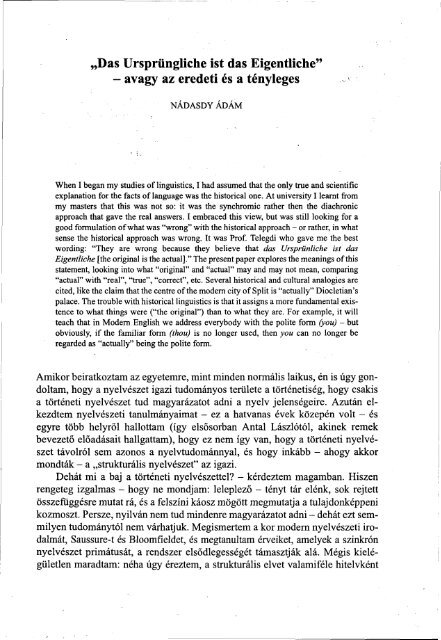
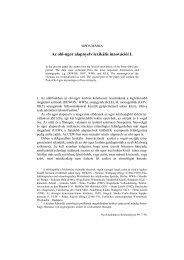
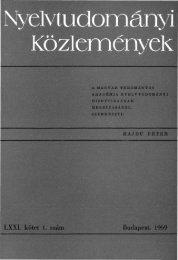
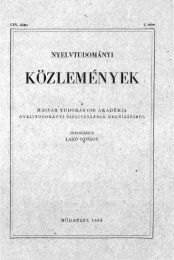
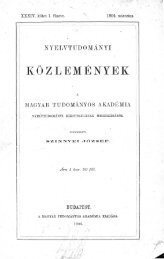
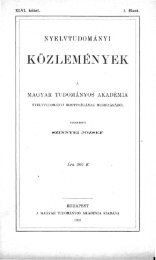
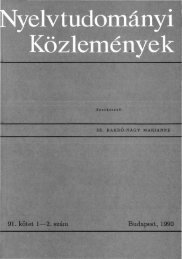
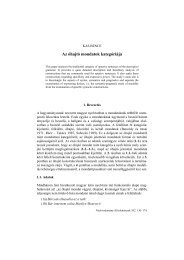
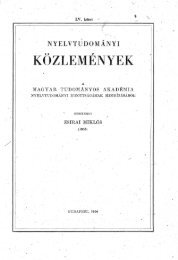
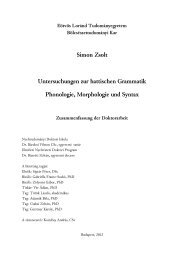
![Gósy Mária: A [p, t, k] mássalhangzók zöngekezdési ideje Bevezetés ...](https://img.yumpu.com/15682849/1/190x245/gosy-maria-a-p-t-k-massalhangzok-zongekezdesi-ideje-bevezetes-.jpg?quality=85)
